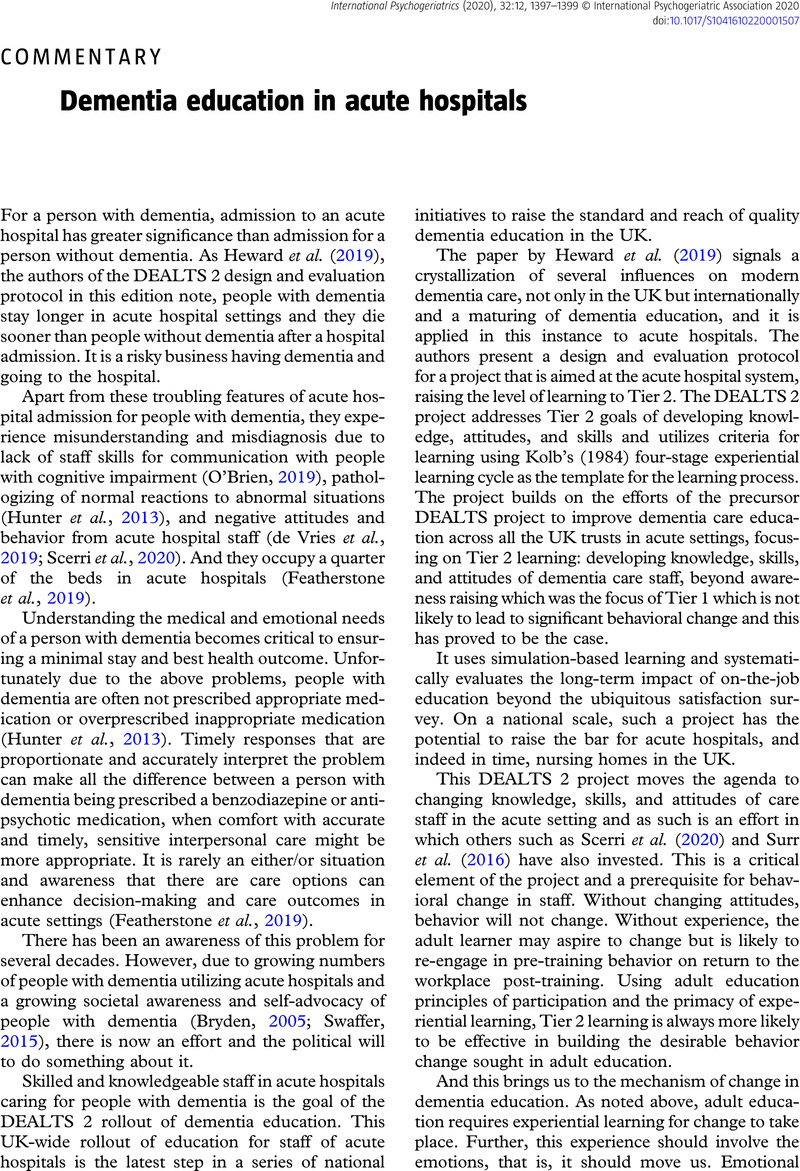No CrossRef data available.
Article contents
Dementia education in acute hospitals
Published online by Cambridge University Press: 30 December 2020
Abstract
An abstract is not available for this content so a preview has been provided. Please use the Get access link above for information on how to access this content.

- Type
- Commentary
- Information
- International Psychogeriatrics , Volume 32 , Special Issue 12: Issue Theme: Implementation Science , December 2020 , pp. 1397 - 1399
- Copyright
- © International Psychogeriatric Association 2020
References
Bryden, C. (2005). Dancing with dementia: my story of living positively with dementia. London: Jessica Kingsley.Google Scholar
de Vries, K., Drury-Ruddlesden, J. and McGill, G. (2019). Investigation into attitudes towards older people with dementia in acute hospital using the Approaches to Dementia Questionnaire. Dementia (London, England), 18, 1471301219857577. doi: 10.1177/1471301219857577
Google Scholar
Featherstone, K., Northcott, A. and Bridges, J. (2019). Routines of resistance: an ethnography of the care of people living with dementia in acute hospital wards and its consequences. International Journal of Nursing Studies, 96, 53–60. doi: 10.1016/j.ijnurstu.2018.12.009
CrossRefGoogle ScholarPubMed
Featherstone, K. et al. (2019). Refusal and resistance to care by people living with dementia being cared for within acute hospital wards: an ethnographic study. Health Services and Delivery Research, 7
(11). doi: 10.3310/hsdr07110
CrossRefGoogle Scholar
Heward, M., Board, M., Spriggs, A. and Murphy, J. (2019). Design and evaluation protocol for DEALTS 2: a simulation-based dementia education intervention for acute care settings. International Psychogeriatrics, 32,
1439–1448.CrossRefGoogle ScholarPubMed
Hunter, P.V., Hadjistavropoulos, T., Smythe, W. E., Malloy, D. C., Kaasalainen, S. and Williams, J. (2013). The Personhood in Dementia Questionnaire (PDQ): establishing an association between beliefs about personhood and health providers’ approaches to person-centred care. Journal of Aging Studies, 27
(3), 276. Available at: https://ezp.lib.unimelb.edu.au/login?url=https://search.ebscohost.com/login.aspx?direct=true&db=edsgao&AN=edsgcl.339800227&scope=site
CrossRefGoogle ScholarPubMed
Killett, A. et al. (2016). Digging deep: how organisational culture affects care home residents’ experiences. Ageing & Society, 36
(1), 160.CrossRefGoogle Scholar
McCarthy, B. and Davis, S. (2010). Implementing best practice in dementia care: the role of electronic learning resources in developing sustainable practice. Alzheimer’s & Dementia, 6, e28–e29. http://dx.doi.org/10.1016/j.jalz.2010.08.089
CrossRefGoogle Scholar
Nolan, M. et al. (2008). The role of education and training in achieving change in care homes: a literature review. Journal of Research in Nursing, 13
(5), 411–433.CrossRefGoogle Scholar
O’Brien, R. (2019). The development of a communication skills training intervention for healthcare professionals caring for people with dementia in the acute hospital setting: an applied conversation analytic study. PhD thesis, University of Nottingham.Google Scholar
Scerri, A., Innes, A. and Scerri, C. (2020). Person-centered dementia care in acute hospital wards—The influence of staff knowledge and attitudes. Geriatric Nursing, 41
(3), 215–221. doi: 10.1016/j.gerinurse.2019.09.001
CrossRefGoogle ScholarPubMed
Surr, C. A., Smith, S. J., Crossland, J. and Robins, J. (2016). Impact of a person-centred dementia care training programme on hospital staff attitudes, role efficacy and perceptions of caring for people with dementia: a repeated measures study. International Journal of Nursing Studies, 53, 144–151. doi: 10.1016/j.ijnurstu.2015.09.009
CrossRefGoogle ScholarPubMed
Swaffer, K. (2015). Nothing About Us, Without Us! 20 Years of Dementia Advocacy(11), 47. Available at: https://ezp.lib.unimelb.edu.au/login?url=https://search.ebscohost.com/login.aspx?direct=true&db=edsgao&AN=edsgcl.443551624&site=eds-live&scope=site
Google Scholar
Town, J. M., Lomax, V., Abbass, A. A. and Hardy, G. (2017). The role of emotion in psychotherapeutic change for medically unexplained symptoms. Psychotherapy Research, 29
(1), 1–13. doi: 10.1080/10503307.2017.1300353
Google ScholarPubMed


